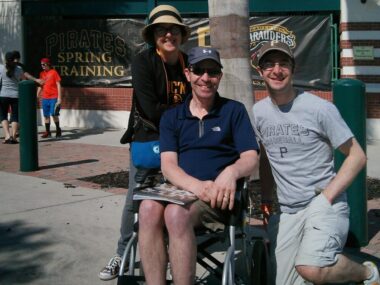Why Staying Informed About Multiple Sclerosis is Important
Written by |


A lot has changed in multiple sclerosis research and treatment since I was diagnosed 30 years ago. Here are a few things I was told originally that are no longer true:
- There’s less than a 1% chance for a child to inherit their mother’s MS.
- The first two years after diagnosis maps the course of the disease.
- The greatest medicine is bedrest.
- Yoga, tai chi, and meditation have no proven benefits for an MS patient.
I didn’t receive bad advice from my first neurologist. But, after looking back, it sounds off-the-wall and barbaric. Today’s research has changed the MS climate and newly diagnosed patients are, thankfully, the beneficiaries.
I tell newly diagnosed patients they are diagnosed at a good time. They’re blessed to have choices of medications. There’s a variety to choose from — injectable, oral or infusions — and people are no longer told, as I was, to go home and rest. Steroids are not the only option for treatment.
Hooray research! Hooray science!
Pharmaceutical companies are clamoring to discover the next “best” drug and we are fortunate they are. As the old DuPont slogan used to say: “Better Living Through Chemistry.”
As a patient, I’ve learned to remain curious and informed about the latest in news and research and to be vigilant about what resources to trust. I’ve read a lot of scams over the years about people trying to sell expensive cures or herbs as the one-and-only panacea. The adage “buyer beware” comes to mind.
I’ve run into well-intentioned people who’ve told me I don’t have MS, but I have something else. One woman even stuffed my mailbox full of books on some disease she thought I had. I don’t know what she based her non-medical diagnosis on, but I wrote a thank you (but no thank you) note and placed it and her books back into her mailbox.
As for the advice I received originally, I want to offer the current school of thought on those assertions:
There’s less than a 1% chance for a child to inherit their mother’s disease: The percentage has increased, according to the National Multiple Sclerosis Society: “For first-degree relatives of a person with MS, such as children, siblings or non-identical twins, the risk rises to approximately 2.5-5% — with the risk being potentially higher in families that have several family members with the disease.”
The first two years after diagnosis maps the course of the disease. I’ve read that 85% of patients living with relapsing-remitting MS will eventually transition into a more degenerative type of MS. My heart stopped when I first read that statistic. It still does.
The greatest medicine is bedrest. There have been countless studies that prove exercise is beneficial for people with MS. Moderation is essential. Aerobic exercise can increase strength and balance while decreasing MS-related spasticity. Water aerobics, where a patient feels buoyant, can help with balance while reducing the risk of falling. Many other forms of exercise should be explored to suit the needs of the patient.
Yoga, tai chi, and meditation have no proven benefits for the MS patient. Wellness classes are now offered by the National Multiple Sclerosis Society and other MS organizations as a way to help people live fully and well. Programs such as yoga, tai chi, and aquatic therapy are offered as part of wellness programs. Equine therapy also has been shown to be effective for physical and mental health. Meditation has been shown to reduce stress and anxiety.
The world of MS is changing all the time. Stay informed, ask questions and if you have concerns, speak to your clinician. The past 30 years has taught me to trust my instincts to be my guide. You should trust yours, too.
***
Note: Multiple Sclerosis News Today is strictly a news and information website about the disease. It does not provide medical advice, diagnosis, or treatment. This content is not intended to be a substitute for professional medical advice, diagnosis, or treatment. Always seek the advice of your physician or other qualified health provider with any questions you may have regarding a medical condition. Never disregard professional medical advice or delay in seeking it because of something you have read on this website. The opinions expressed in this column are not those of Multiple Sclerosis News Today, or its parent company, Bionews Services, and are intended to spark discussion about issues pertaining to multiple sclerosis.


Eva
And this is what i have kesrnt, i recently wrote all my knowledge in those notes for a friend's daughter who at 12 was diagnosed with Ms
Perhaps you will find some if it useful for your sister
Supplements: lipolic acid 600 iu daily
Curcumin active ingredient of tumeric: 10000 ui antinflamatory and enhances cognitive function
Fish oil 1000 ui
Japenese matcha tea benefits : daily
http://www.naturallivingideas.com/10-amazing-benefits-of-matcha-green-tea/
Sleep - melatonin 5-10 iu
Pain- mantra
yoga
Swimming
One of the factors which play a proven role in ms is geograhical location and vitamin D exposure
Study on vit, D by dr. combria in Brazil best for RR MS patients go into total remission.
http://www.thisisms.com/forum/coimbra-high-dose-vitamin-d-protocol-f57/topic27182.html
10000 ui va 20000 ui this is super safe to take. Your daughter levels are too low. To ve on safe side: do calcification 24 hour urine test every 3 months and have her drink 2.5 liter of fluid daily to help kidnneys to flush calcium out.
Dr. Coumbria levels for patients are anyways much higher and very frim 50000 ui to 120000 ui depending on body weight. But i would not recommend to do it without doc. Supervission
Very important: Cognitive help to keep the brain sharp
1.Languages
2.Music
3.Co curcumain
4.Learning
5.Reading
6. Lumocity.com
Inflamation:
Gluten and lactose causes severe and tearing of stomach lining: immediate not gradual! diet change is a must!!!
Add also a 50 billion dose of probiotics daily
See research:
http://multiplesclerosisnewstoday.com/2017/02/28/actrims2017-gut-probiotics-topic-ms-forum/
And this is the one
https://shop.vsl3.com/mobile/vsl3-c2.aspx
Best proven diet for nurishing mitochondria snd cells is dr. Walhis
Walhis nutrien dense diet
https://www.amazon.com/gp/aw/d/1583335544/ref=dbs_a_w_dp_1583335544
https://youtu.be/KLjgBLwH3Wc
I just had stem cells harvested from fat for my new upcoming treatment
My cells viability are at 97% vs average patient 84%
My doctir said it is tge higest number he had seen since 2010 on any of his patients.
To maintain your daughter overall health and boost her antiinflamatory defences her diet and supplements for ms must be 100% correct
Brain lesions vs. Spinal
Dont do steroids unless optic nerve affected or need to reduce/ stop active inflamation
Dont wait if she still has active inflamation that means demages occure!
Lesions once formed are mostly there to stay that causes disability and increase handicap
Well witj RR MS SOMETIMES THEY do heal but at times some dont and you never know what will occure. So dont wait.
Dont do : betaseron avonex, gelina, rituxan. These are highly inefective
Coukd work:
Copax-one vs. Combine with supplements diet and Vitamin D therapy
Dr. Combria actually uses with huge success only d therapy protocol alone.
But he is in San Paulo and only treats patients in his clinic who can travel to see him and his team twice a year in the first year or two. For most patients ms there after is in remission
If mri shows new lesions
Know that copaxone does not work. Change immediately Dont wait
Dont let her take other drugs to suppress ms symptoms : They cause fatigue, brain fog create zombies
I know patients who are on about 20-25 other symptom suppressing medication plus the main one and they are literally in a state of haze.
Change immediately if any lesions occure on copax one : to the new Ocrevus which is researched to ve highly effective.
If insurance does not all it , fight it with all you have it is your's daughter life.
Change the insurance or pay higher premium
But give her the best there is because:
Lesions lead to scare tissue which further slows down electrical impulses : gradual loss of function over time on old lesions and eventually axonal demage! You never want to get to this point!
Now:
Know that there is a. Procedure almost called a cure: but it is expensive
Research Hsct
HSCT IN MANY CLINICS AROUND THE WORLD originated in Chicago by dr. Burt
And there is a grest one in Germany
The approach is to do it if copax one or ocrevus wont work and her EDSS DEEPENS
Just remember is she goes under edss 6.5 nobody will touch her with any therapy. Hopeful it will never come to that.
http://www.hsctstopsms.com/hsct-facilities-worldwide/
Them follow up stem cell trial in Jerusalem / prof. Dimitrios Karussis
Stem cells research in combination with the role of t/reg cells in
Belfast by dr. Yvonne Dombrovsky
http://us.blastingnews.com/news/2017/03/multiple-sclerosis-the-immune-system-can-repair-myelin-001574369.html
And the notable findings re: ms patients '
Own cells vs. Relatives
http://multiplesclerosisnewstoday.com/2017/04/04/study-on-faulty-multiple-sclerosis-stem-cells-suggests-patients-need-tailored-therapies/
R
Thanks for all your info. Please clarify regarding your positive comments on Ocrevus and negative comment on Rituxan as they are quite similar.
R
Cathy,
Could you cite where you read that the first two years are no longer a prognostic indicator?
Cathy Chester
R,
I've read many articles on the subject. As you know MS manifests differently in each patient so the numbers aren't hard-and-fast rules. A reliable prognostic indicator for MS is limited. You will see a variety of answers/numbers cited in each study. The 2-year indicator I was originally told has not been mentioned in any of the research I've come across. (NOTE: For the purpose of this site I'm unable to cite all of the research I've read.) Here are a few examples:
http://multiplesclerosis.ucsf.edu/education_and_support/about_multiple_sclerosis
https://www.ncbi.nlm.nih.gov/pubmed/19953117
http://www.nejm.org/doi/full/10.1056/NEJM200011163432001#t=article